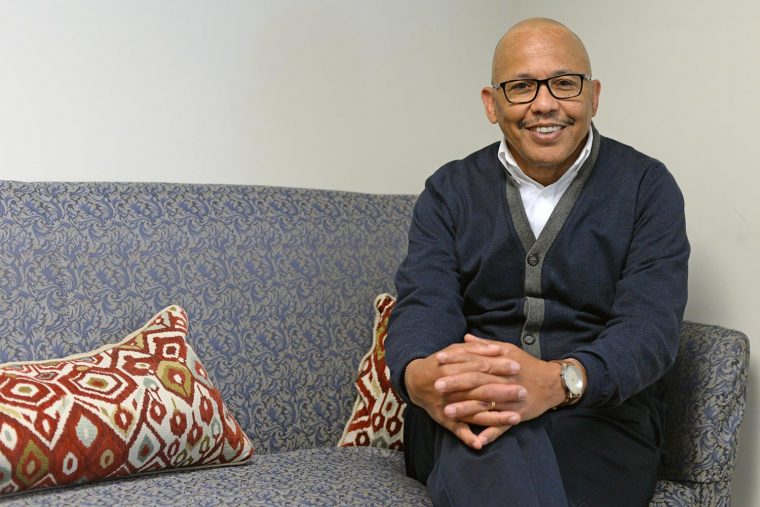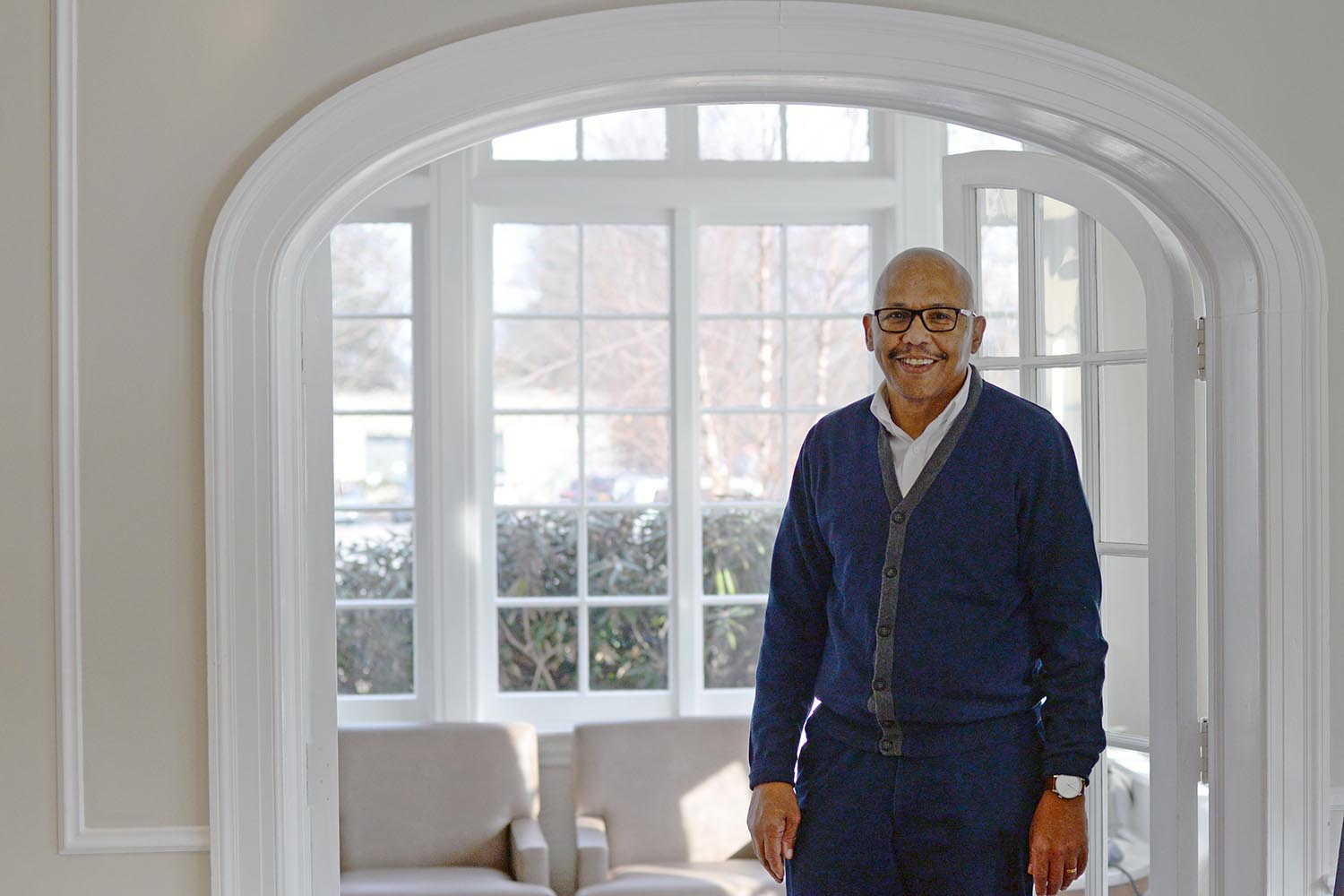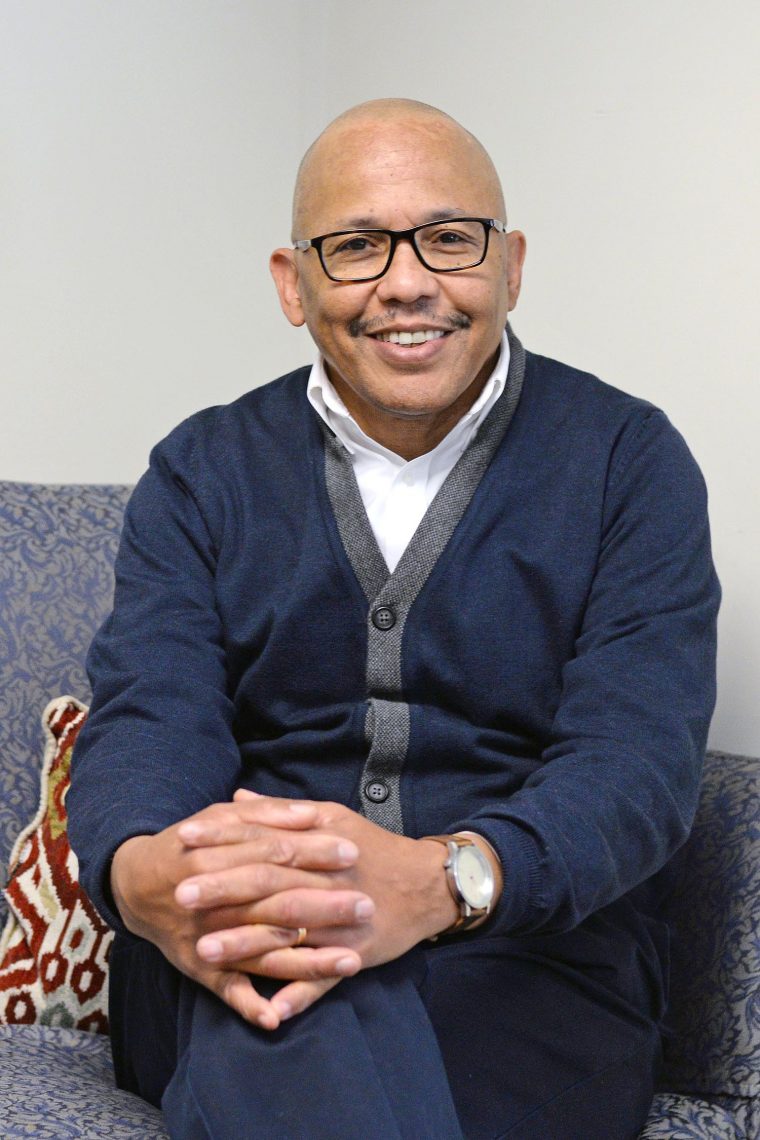Thornton Leaving Legacy of Student of Color Recruitment at Wesleyan


To listen to Cliff Thornton speak with prospective students and parents is to feel included, even if you’re eavesdropping.
Thornton is associate dean of admission at Wesleyan, covering a wide geographic and socioeconomic range: the South Central U.S. from Kentucky to Louisiana, Manhattan, Puerto Rico, the U.S. Virgin Islands, and the Caribbean. Having served these communities—and Wesleyan—now for more than 30 years, it makes sense that he would demonstrate an ease and fluency in his relations with so many different people from such different backgrounds. He’s had a lot of practice.
But something unique about Thornton, which by many accounts has been true from the beginning of his time at Wesleyan, is how his holistic approach impacts students. To hear him tell it:

“Working in admission is good in two ways. First, it’s great to be in an educational environment and to believe in the mission. Second, if practiced correctly, it’s a lot like teaching. It might surprise some to hear this, but at the end of the day I don’t consider it my job to make sure a student comes to Wesleyan. My job is to help them make an informed decision. Particularly with underrepresented populations, this is a big challenge. As Dr. Cornel West has said of the African American community: What we often suffer from is a poverty of information. That’s a driving force for me—making sure students have the right information to make such a crucial decision.”
This approach bears itself out in Thornton’s work on a daily basis. In a recent information session with a large group of prospective students and parents, he was clear that the session should be a conversation. Hearing and helping the group talk through their questions and concerns was as important as presenting to them. Fifteen minutes in, students and parents alike were openly talking about their college search experiences (good and bad), and were responding to and assisting one another. Thornton and senior interviewer Shana Laski ’19 served more as facilitators than lecturers. By the session’s end, the prospective group left informed and enthused—well-educated on what Wesleyan had to offer, and clearer about what they wanted and had to offer in turn.
Thornton’s unique understanding and approach at least partially derives from his own educational background. Prior to joining Wesleyan in 1985, he was an adjunct professor and actively considering a PhD. While dating someone who was already enrolled in a doctorate program, he was exposed to the “torturous path” of attaining that terminal degree, and was bumped from his adjunct role by another professor with a PhD.
“I lost my taste for wanting to be a professor,” he said.
But he hadn’t lost his taste for higher education, and working in admission offered the chance to continue in an environment he liked, serve a mission he believed in, and leave room to reconsider another degree later on. Ultimately, that transition marked the beginning of a 30-year career in which Thornton has helped to establish and lead the University’s historic commitment to a diverse and academically elite student body, a defining feature of the Wesleyan experience.
“Cliff was such a great recruiter,” said Glaister Leslie ’08. “He came to my high school in Jamaica and saw something in me that I myself didn’t see. I went to Wesleyan because of him. And I was back at Wes this past May for my 10-year reunion and as I reflected on how much Wesleyan had shaped me, I thought how it was all due to Cliff.”
Thornton recently announced that he will retire at the end of the Spring 2019 semester, and it’s safe to say he has made a compelling case for higher education generally, and Wesleyan specifically. Wesleyan is among the most diverse liberal arts colleges in the country in no small part thanks to his efforts.
As he wraps up his final fall semester, Thornton took time to sit down in his office, located in the historic Stewart M. Reid House on Wyllys Avenue, and reflect on his accomplishments, Wesleyan’s future, and some of his fondest memories.
Q: What are some of the highlights from your time at Wesleyan?
A: We’ve had very positive relationships with community-based educational organizations (CBOs) around the country, like A Better Chance and Prep for Prep. We were able to convene those organizations early on and help them start communicating with one another. For example, we established a two-day event with keynote speakers and spaces for CBOs from across the U.S. to engage in extended conversations and share best practices; it helped them improve, educated the admissions deans and helped us expand our efforts well beyond the northeast and better understand the issues that impact underrepresented students. It’s been a great way to highlight Wesleyan’s commitment to the populations these organizations serve, and we’re one of the few institutions that does as expansive a program as we do.
We’ve also been able to make a difference for a lot of students from the Caribbean, especially in Jamaica. Early on in my time here, I made the case to expand our efforts there to Barbara-Jan Wilson, former dean of admission, and the first couple of years we enrolled two top students: one transfer student, Imani Duncan ’99, who went on to earn an MA from the Kennedy School at Harvard and is currently the Chief of Staff to the leader of the Opposition party in Jamaica and a 2018 Eisenhower Fellow; and Kim Marie Spence ’00, who I believe was Wesleyan’s first female Rhodes Scholar and just earned her PhD in 2018. Those two helped establish Wesleyan as the most widely-recognized NESCAC school in the country.
A third area is the work—though not nearly as successful—that I’ve done in the South, creating more geographical diversity, and specifically focused on multi-generational African American students.
Q: What has kept you doing it for so long?
A: First of all, I enjoy the work. The way I approach the work—I’m not sure everyone does it the same way. I just want to make sure I’m addressing the poverty of information issue, and Wesleyan has been a wonderful platform to do that. It’s given me access to people and places because of its relationships and reputation that allow me to have that kind of impact.
We sometimes live on this idea that we punch above our weight class. That sounds very noble. What it really translates to is that we have to work a lot harder and longer for less or equal results than our counterparts at peer schools. We manage to be successful with our relatively limited resources. But a lot of my satisfaction is struggling with limited resources and still managing to educate students on what they can do to make themselves competitive in an applicant pool and communicating the value of a liberal arts education.
Q: What have you learned from students? Alumni?
A: I’m always amazed at the trajectory of their lives. A lot of them I know from high school. They’re coming from a range of schools. But through hard work, commitment, their resilience, their perseverance, they have gone on to do extraordinary things when some of the objective measures might not have suggested that success. I marvel at what those students and alumni have accomplished. To be witness to that to some degree.
Alumni will often start out by saying to me, “You probably don’t remember me, but I graduated from Wesleyan in 1995….” And I always remember them. That’s why I’ve continued to do this work. I’ve had the privilege to witness their growth and success. Alan Smith ’90 is a great example—he’s actually the first student I spoke with about Wesleyan. After graduating Wesleyan, he went on to earn his MBA from Columbia. I got an email from an alum about a week ago, Celia Santana ’90, who was writing because she said she’d heard I was retiring. The subject line was “you can’t retire.” She went on to talk about my influence on her decision to turn down offers from Harvard or Brown, and come to Wesleyan, which had a significant influence on how her life turned out. It’s amazing to me to hear that. I don’t take any credit for that, but they sometimes seem to think I should.
The truth is that some students blew the gate off its hinges, and some needed some influence and help to crack that gate, but however they got here, they’ve gone on to great professional and academic success. Many of them have taught me a lot about how resilience and determination can overcome hardship and objective measures that for some might suggest a different outcome.
Q: What is different about Wesleyan’s value proposition?
A: Wesleyan may not be a household name everywhere, but the people that will make a difference in your career (the human resource manager that screens your resume, the law school or med school committee), they know the quality of the educational experience. That’s what Wesleyan can do for you.
It also offers such a diversity of thoughts and opinions, whatever you want to major in. Prospective students will often ask: Do you offer Business? No, but consider this: if you were to go around the room and ask people to name the best college or university in America, what do you think most people would say? Usually it’s an Ivy. Harvard, Brown, perhaps Stanford. Then I follow up and say: would it surprise you to know that you can’t go to any of the Ivies at an undergraduate level, except for UPenn, and major in business? Harvard’s mission is to train the next generation of leaders. That’s their goal. All of these people who are spending great sums of money to send their children to these schools. Why do you think that is? Maybe it’s because they’ve concluded that specialization is not important on the undergraduate level. What’s important is that broader set of skills that you develop. And you can go on later and get an MBA. That’s how elite institutions prepare their graduates for careers, and that’s what Wesleyan can do for you.
Q: What advice can you offer to the next person in this role?
A: I hope that whoever fills the position has both experience and passion. The people that do this work and do it well see it as more than just a job, and that’s a hard thing to figure out about someone in a job interview. But it’s crucial for addressing these larger social inequities and educational disparities. Because ultimately students who make the decision to come to Wesleyan are often coming in part because of the person that introduced them to the benefits of a Wesleyan education. The admission officer may be their only source for information and sometimes that’s going to require work after hours. Everyone involved in admission is interested and committed to access and diversity, but not everyone will go the extra mile.
Here’s an example, one that even surprises me, of how that extra effort can play out.
Wanda Gibson ‘92, out of North Carolina, is now the senior associate director of the career center and an assistant dean of students at Pomona. She reminded me that her mother to this day still doesn’t like me because she holds me responsible for her daughter leaving North Carolina and not coming back. She reminded me that I went to her house and spoke to her mother about Wesleyan and convinced her mother, as Wanda tells it, to allow her to visit Wesleyan. That sold Wanda on Wesleyan. I’m still amazed that I even went that far.
Q: Do you have plans for retirement?
A: I feel like a high school student now with people asking me what I’m going to major in. Guess I’m undecided! What I do know is I won’t be sitting around the house. If I want to maintain my marriage, my wife isn’t going to tolerate that. I’m still wrapping my head round the idea that in the not too distant future, something that’s been a part of my life for so many years won’t be there in the same way. But, of course, I can’t separate myself completely from Wesleyan because my wife is a class dean, so she’ll help maintain my ties.
I’ll probably just sit it out for several months and then get up one morning and decide I’ve had enough. And I’ll certainly keep trying to find ways that I can address that core issue of information shortages in underrepresented communities. The only thing I’m certain about is I won’t be idle.
Q: What makes you hopeful?
A: It probably goes back to students to a large extent. We generally know how bright young people are. But to see students who are doing so much and have achieved at such a high level, often against the odds, leaves me in awe. Every time I pick up an application, or at least a lot of the time, it makes you feel better and feel excited about the future.
In recognition of Cliff’s long-time service to Wesleyan and his tireless dedication to financial aid and admission, the University is pleased to establish the Clifford Thornton Endowed Wesleyan Scholarship. If you’d like to make a contribution in honor of Cliff, please click here or contact Marcy Herlihy (email: mherlihy@wesleyan.edu/ 860-685-2523) in University Relations for more information.

